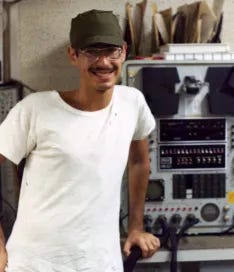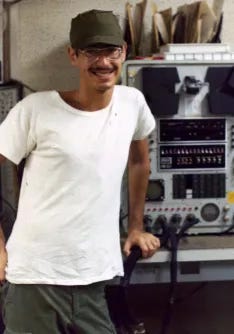For almost half a century I’ve lived and worked in Silicon Valley. I was lucky to be present at the creation of the technologies that now drive our economy and have transformed the world – for better and worse – the first microprocessor companies, the first personal computers, the first Internet applications, as well building supercomputers, consumer electronics, and systems for national defense. I’ve stood in the same room with extraordinary visionaries and remarkable engineers, all the while surrounded by an ecosystem of creative, relentless and tenacious individuals who had no respect for the status quo. I’ve taught the next generation of entrepreneurs, now building our AI-enabled future, and others at the intersection of technology and national security.
It’s been one heck of a ride.
I remind my students that sane people have normal jobs, while founders are closer to artists than any other profession. They see things that others don’t and spend their lives trying to bring those visions to fruition. This worldview has shaped my career.
For the next few months I’ll be posting a series of posts on family, startup culture and careers. These vignettes are about how I’ve lived my life trying to make my dent in the universe and trying to teach others to do the same. I don’t expect you to agree with all the posts.
This first post was written 10 years ago, but is even more relevant today.
“Some men see things as they are and say, why;
I dream things that never were and say, why not?”
Robert Kennedy/George Bernard Shaw
I got a call awhile ago that reminded me that most people live their life as if it’s predestined – but some live theirs fighting to change it.
At 19 I joined the Air Force during the Vietnam War. Out of electronics school my first assignment was to a fighter base in Florida. My roommate, Glen, would become my best friend in Florida and Thailand as we were sent to different air bases in Southeast Asia.
On the surface, Glen and I couldn’t have been more different. He grew up in Nebraska, had a bucolic childhood that sounded like he was raised by parents from Leave it to Beaver. I didn’t, growing up in a New York City apartment that seemed more like an outpatient clinic. Yet somehow we connected on a level that only 19-year-olds can. I introduced him to Richard Brautigan and together we puzzled through R.D. Laing’s The Politics of Experience. We explored the Everglades (and discovered first-hand that the then-new national park didn’t have any protective barriers on their new boardwalks into the swamps and that alligators sunning themselves on a boardwalk look exactly like stuffed ones – until you reach out to touch them.) In Thailand I even figured out how to sneak off base for a few days, cross Thailand via train, visit him in his airbase and convince everyone I had been assigned to do so (not that easy with a war on.) The chaos, the war, our age and our interests bonded us in a way that was deep and heartfelt.
Yet when the Vietnam War wound down, we were both sent to bases in different parts of the U.S. And as these things happen, as we grew older, more people and places came between us, and we went on with our lives and lost touch.
Four Decades Later
Glen reached out with an email, with a subject line that only someone who knew me in the Air Force could have sent. While that caught my attention, the brief note underneath stopped me in my tracks. It read, “You have crossed my thoughts through the years. The other night you appeared in my dreams. I actually remembered it in the morning and googled your name. By God, there you were. A bit overwhelming…”
You bet it was overwhelming, it’s been 40 years since I last heard from Glen.
On the phone together, I spent an hour with an ear-to-ear grin as both of us recounted, “when we were young, crazy and stupid” stories, stories I still won’t tell my children (which makes me grateful it was life before social media documented every youthful indiscretion.) Glen even reminded me of my nickname (which still makes me cringe.) The feel of long forgotten camaraderie let me wallow in nostalgia for a while. But as Glen began to catch me up with the four decades of his life, it was clear that while we both had the same type of advanced electronics training, both had been on the same airbases, and essentially both had been given the same opportunities, our careers and lives had taken much different paths.
As he talked, I puzzled over why our lives ended up so different. Listening to him, I realized I was hearing a word I would never use to describe my life. Glen used the word “predestined” multiple times to describe his choices in life. His job choices were “predestined,” where he lived was “predestined,” who he married and divorced had been “predestined.” I realized that our world views and how we lived our lives differed on that one single word.
“Predestined.”
The path of our lives
While the call brought me back to when we were foolish and fearless, thinking about how Glen lived his life gave me pause. It took me awhile to figure out why. (I wasn’t bothered about anything that Glen did or didn’t accomplish. Nor did I think less of him.) It was his life and he seemed happy with it. Hearing his voice brought back those days of enthusiasm, exploration, adventure and unlimited horizons. But listening to forty years of a life lived summed up as “preordained” felt like a sharp reminder of how most people live their lives.
It made me realize that Glen’s worldview wasn’t unique. Most people appear to live an unexamined life, cruising through the years without much reflection about what it means, and/or taking what life hands them and believing it’s all predestined.
As I’ve gotten older I’ve come to grips that the unexamined life is what works for most people. Most take what they learned in school, get a job, marry, buy a house, have a family, become a great parent, serve their god, community and country, hang with friends and live a good life. And for them that’s great.
Some do want more out of life, but blame their circumstances on others – their parents or government or spouse or lack of opportunities, but almost never on their own lack of initiative. Initiative means change and change is hard for most. (Clearly there are still pockets in the world where opportunities and choice are limited but they are shrinking daily.)
This post will be an uncomfortable mirror for some. It’s not a commentary about Glen. It’s about how some of us have chosen how we live our lives. Perhaps the most painful to watch are those who wake up later in life thinking, “I could have or I should have.”
Pushing the Human Race Forward
Whether we have free will or whether our lives are predestined has been argued since humans first pondered their purpose in life. (Philosophers like Schopenhauer, Nietzsche and Wittgenstein have all been trying to make sense of it.) The truth is we won’t know until the second coming or the solution to the many-worlds theory.
But what we know with certainty is that there is a small set of humans who don’t act like their lives are predestined. For better or worse, regardless of circumstances, country or culture they struggle their entire lives wanting to change the outcome. And a small percentage of these translate the “wanting to change” into acting on it. This small group is dissatisfied with waiting for life to hand them their path. They act, they do, they move, they change things.
Those born into poverty actively strive to change their own lives and that of their children. Those who want to start a company or join one quit their job and do it, while others try to change their political system or fight for social or environmental justice.
And the irony is while the individual stories are inspiring they are trying to tell a much bigger story. These misfits, rebels and troublemakers have been popping up in stories for thousands of years. Every culture has myths about larger than life heroes who rose from nothing. This archetype is a recessive gene common to all cultures. They are the ones that make things happen, they‘re the ones that push the human race forward.
This is what makes and drives entrepreneurs. Our heads are just wired differently.
You Are Master of Your Own Fate
The world is much different then when Glen and I were young and foolish. In the past, even if you did feel this spirit of adventure, you had no idea how and where to apply it. Barriers of race, gender or location threw up roadblocks that seemed insurmountable.
The world is much smaller now. The obstacles aren’t gone but are greatly diminished. Everyone within reach of a smartphone, tablet or computer knows more about entrepreneurship and opportunity and where to get it then all of Silicon Valley did 40 years ago. There’s no longer an excuse not to grab it with both hands.
As far as we know, this life isn’t practice for the next one. For entrepreneurs the key to living this one to the fullest is the understanding that you can choose – that you do have a choice to effect the journey and change the rules, that you can decide to give it your best shot to do something, something extraordinary.
If your passion is startups and innovation, and your community, region or country doesn’t have an entrepreneurial culture and community – help start one. If there’s no funding for startups in your community – get up and move to where it is. If you’re in a company frustrated with the lack of opportunity – change jobs.
But this post isn’t just about entrepreneurship. It’s about what you can do with your life. If you’re unhappy with the status quo – concerned about politics, poverty, climate change, or any other issue, get involved. You can be the change agent.
You are master of your own fate. Act like it.
“And somewhere between the time you arrive
And the time you go
May lie a reason you were alive
That you’ll never know
In the end there is one dance you’ll do alone”
Jackson Browne – For A Dancer
Lessons Learned
The same destiny overtakes us all
What you choose to do with your life in between is what makes the difference







Great thoughts and experiences. I'm going to share with my kids, associates, customers and students.
Thanks, this is Great Inspiration.